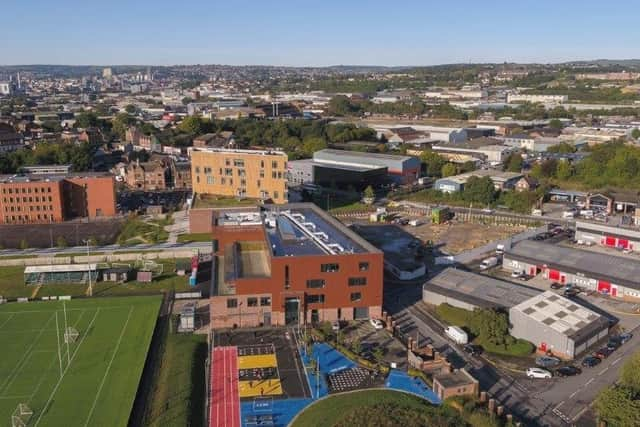An Olympic effort is needed to improve Yorkshire’s health – Richard Stubbs


The Prime Minister recently acknowledged obesity as a ‘serious national issue’, representing a U-turn on his views prior to being hospitalised with Covid-19.
Whilst increased focus on maintaining a healthy weight is welcome, it is essential this is approached in the right way: not simply blaming people for ‘lifestyle choices’.
Advertisement
Hide AdAdvertisement
Hide AdIt’s much easier to make good choices when you have plenty of options, a supportive environment and resources to do so.


Therefore, we should focus on creating the conditions within communities that make it easy for everyone to enjoy better health and wellbeing. This means tackling the social, behavioural, economic and environmental inequalities that drive the causes of obesity.
Tackling obesity isn’t new, we’ve seen more than a decade of policies and campaigns. However, the Covid-19 pandemic has shone a light on this again: having a disproportionate impact on specific parts of the population including those with obesity but also BAME communities, older people, people in the country’s most deprived areas, and those living with long-term health conditions.
The numbers speak for themselves – the least affluent parts of the UK have experienced double the death rate of affluent ones (55.1 deaths per 100,000, compared to 25.3). People living in the least affluent areas are more likely to live with long-term conditions and co-morbidities, including obesity and type 2 diabetes.
Advertisement
Hide AdAdvertisement
Hide AdAs we prepare further outbreaks, it’s vitally important we address the core challenges facing communities and individuals most at risk.
This doesn’t mean highlighting factors which increase people’s risk of Covid-19 and encouraging better choices, instead, we need to tackle the root causes of inequality so everyone has the capital (social, educational and economic) to have choices to make.
Whilst the pandemic’s impact has been undoubtedly catastrophic across the UK, its impact within the North has been stark: the North West has the highest age-standardised mortality rate for deaths involving Covid-19 outside of London.
Meanwhile the recent ‘Levelling Up Yorkshire and the Humber’ report states life expectancy in this region is one year 10 months lower than England’s average and recognises the intrinsic link between health and wealth: poor economic prosperity leads to poor health, whereas interventions designed to improve population health support economic growth and vice versa.
However, the outlook in the North is not all negative.
Advertisement
Hide AdAdvertisement
Hide AdYorkshire has a rich concentration of assets focusing on tackling health/economic inequalities, population health and obesity.
Great headway has also been made in building city-wide engagement in population health and cultures of healthy lifestyles. One such initiative is Move More – led by the National Centre for Sport and Exercise Medicine – which aspires to transform Sheffield into the UK’s most active city: creating improvements in health, wellbeing and quality of life.
Sheffield’s Olympic Legacy Park was created to improve the region’s sports facilities, communities, environment and the economy, with Sheffield Hallam University’s £14m Advanced Wellbeing Research Centre (AWRC) one of its centrepieces.
The AWRC is dedicated to addressing the social, behavioural and economic determinants of health, and creating active communities.
Advertisement
Hide AdAdvertisement
Hide AdThe relationships and assets across communities, public, private, academic and health sectors in Sheffield City Region create a compelling ecosystem to begin tackling health inequality.
By collaborating, co-producing and working towards enhancing the health and wealth of communities, we can improve quality of life, better prepare everyone for future pandemics, and make a meaningful difference to people’s happiness.
We are now at a crossroads, with huge potential to utilise our renewed focus on health and wellbeing as a catalyst to drive widespread improvement in population health, tackle long-standing inequalities, and support economic recovery.
Richard Stubbs is chief executive of Yorkshire & Humber Academic Health Science Network.
Support The Yorkshire Post and become a subscriber today.
Advertisement
Hide AdAdvertisement
Hide AdYour subscription will help us to continue to bring quality news to the people of Yorkshire. In return, you’ll see fewer ads on site, get free access to our app and receive exclusive members-only offers.
So, please - if you can - pay for our work. Just £5 per month is the starting point. If you think that which we are trying to achieve is worth more, you can pay us what you think we are worth. By doing so, you will be investing in something that is becoming increasingly rare. Independent journalism that cares less about right and left and more about right and wrong. Journalism you can trust.
Thank you
James Mitchinson
Comment Guidelines
National World encourages reader discussion on our stories. User feedback, insights and back-and-forth exchanges add a rich layer of context to reporting. Please review our Community Guidelines before commenting.